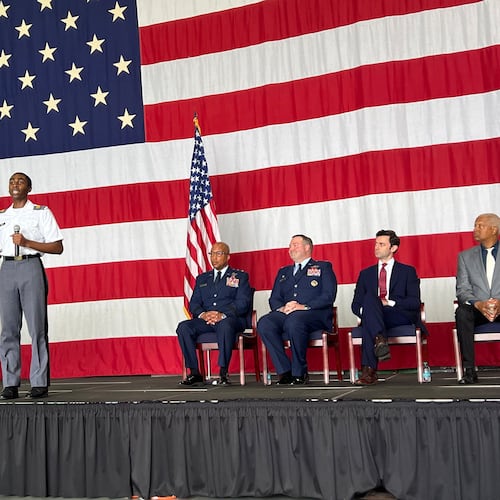Six days after Atlanta’s Chief Procurement Officer instructed employees to notify him if they were contacted by federal investigators, David L. Wilson II withdrew the directive on Monday.
Mayor Keisha Lance Bottoms appointed Wilson, a retired lieutenant colonel in the Air Force, as procurement chief in June 2018.
“While I appreciate learning of any communications coming directly from the Department of Justice, it is not mandatory that you notify your supervisor about those discussions,” Wilson wrote in an email to procurement staff members on March 2.
Wilson underlined the word not.
The U. S. Attorney's Office has focused on the city's procurement department for years as part of a long-running corruption investigation at City Hall. Wilson's predecessor, former procurement chief Adam Smith, is serving a 27-month prison sentence for accepting bribes.
In a Feb. 26 email, Wilson wrote: “If you are contacted by the Department of Justice, please inform your supervisor. Supervisors, notify me via call or text on my city cell.”
While Wilson’s intent in asking staff to report contacts with the DOJ is unclear, experts told The Atlanta Journal-Constitution that the request was inappropriate.
“The Department of Justice could look at this message as an attempt to obstruct justice,” said Peter Henning, a law professor at Wayne State University in Detroit. “Telling workers to contact their supervisor could be viewed as an effort to keep information from coming out that would be an embarrassment to the City of Atlanta.
“In addition, if approached and asked to be a confidential informant, this email would likely discourage someone from acting in that way.”
Spokesmen from the FBI and U.S. Attorneys Office declined to comment. A spokesman for the mayor’s office didn’t directly answer when asked if the mayor thinks Wilson’s request was appropriate.
“Lt. Col. Wilson was simply making his employees aware that if reached out to by the authorities to ensure appropriate coordination with the City Law Department to enable the swift prioritization of any requests made by authorities,” spokesman Michael Smith said.
Richard Hyde, chief investigator for the Balch & Bingham law firm who authored the 800-page report on the Atlanta Public Schools cheating scandal for Gov. Sonny Perdue, said Wilson’s initial email could have “a chilling effect on truth-seeking.”
Council President Felicia Moore said the email raised several questions: Did Wilson have the authority to order employees to notify him of FBI contacts? Why did he want to be notified? Could the directive interfere with the investigation?
Moore said she is most troubled because Wilson’s emails seem to indicate that federal investigators are still taking a hard look at the procurement department.
“He wouldn’t be asking to be notified if employees hadn’t made it clear that they were being contacted,” Moore said.
Bottoms press office credits Wilson with creating new e-Procurement system that is automated makes the process more efficient for the city and the business community.
Citymart, an international organization that rates cities procurement departments, announced last year that Wilson had taken the procurement department’s “small business access” from 27th to first place “by providing the best discovery and decision-making experience for small business.”
Multiple ongoing investigations
The Justice Department investigation dates back to 2015 and has resulted in six guilty pleas from contractors and city officials. Two people — political operative and former city employee Mitzi Bickers, and contractor Jeff Jafari — have been indicted on charges that include bribery.
The city is also being investigated by the Department of Housing and Urban Development, the IRS, the Federal Aviation Administration, and the Securities and Exchange Commission.
Wilson has been subject to an internal investigation over an alleged inappropriate relationship with his executive assistant. City officials have said they have found nothing to substantiate the claims.
Moore speculated that Wilson probably didn’t have the law department approve his first email sent on Feb. 26, but that city lawyers helped craft Wilson’s Monday missive.
In that email, after he told employees that they didn’t have to tell him if the Justice Department reached out to them, Wilson wrote: “By contrast, please do notify your supervisor about any requests you receive from the Legal Department or outside counsel as it pertains to the DOJ requests, as we want to treat those requests as high priority items.”
ORIGINAL DOCUMENTS
About the Author
Keep Reading
The Latest
Featured


